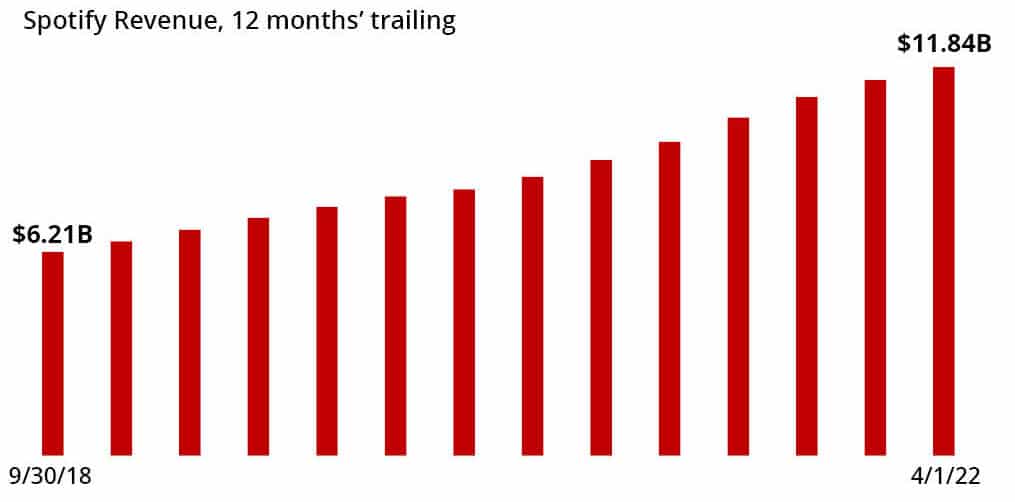Although Spotify’s music library of 70 million songs is similar to other streaming services, it has over 422 million highly engaged users and 1.5 times more market share than Apple Music, its closest competitor. In addition, on average, Spotify’s listeners engage with its platform 61 times per month. Comparatively, Apple Music listeners engage with its platform roughly 12 times per month, 5 times less often.
What explains this disparity in seemingly similar service providers?
Thanks to AI, Spotify delivers a personalized listening experience for every customer to keep them on the platform and connected to friends and artists. Personalized playlists are the secret to Spotify’s success. In fact, 30% of Spotify streams come from AI-recommended songs.
Distributors can learn from Spotify’s success.
How Spotify Uses AI To Dominate the Streaming Industry
Discover Weekly, a feature introduced in 2015, delivers personalized playlists based on streaming history, listening trends and liked music from every one of Spotify’s active monthly users. These curated lists are generated by the company’s discovery and recommendation AI engine and help listeners find new songs and artists, even when they aren’t sure what they want to listen to on a particular day. As a result, users who regularly listen to Discover Weekly spend twice as much time on the platform as those who don’t.
Spotify uses three key AI technologies to drive its recommendation software: collaborative filtering, natural language processing (NLP), and audio models.
- Collaborative filtering – analyzes and compares user listening patterns to determine common interests and make recommendations about what other songs a user might enjoy.
- Natural language processing (NLP) – analyzes text online, such as social media posts, blogs and news articles, to learn about various artists, albums and genres. It then uses this data to recommend songs based on public perception and perceived similarities between artists.
- Audio models – Perhaps the most complex, this technology analyzes the raw data of each song, such as the lyrics, tone, instrumental variances and other characteristics, to learn about and recommend songs to users interested in similar-sounding music. This is a great way for new artists who may not have a large following or online media coverage to gain exposure. This is highly innovative relative to the Certainty Factor (CF) and Natural Language Processing (NLP).
Spotify’s hyper-personalization AI keeps customers engaged by consistently suggesting new music that aligns with their listening preferences. The more active users, the better the AI becomes at recommending the right song to the right user. In addition to helping users find new artists and music they will enjoy, it also helps the platform maintain dominance by drawing more users in and encouraging them to purchase a premium subscription. Every Spotify user gets a unique experience, and every new listener makes the platform better.
Spotify’s investment in AI-driven personalization has helped them become the dominant streaming platform.
They have also grown revenue consistently since going public in 2018 (Source)

What Can Distributors Learn from Spotify’s Personalization Models?
While Spotify operates in a vastly different industry than distributors, both share some of the same challenges AI can solve.
Massive catalogs require curation: Spotify users and distributors’ customers struggle with the same problem: finding what they want and need from enormous catalogs. Spotify has a 70 million-song catalog, and most distributors have thousands or tens of thousands of SKUs. AI sorts through the data. In the same way that Spotify’s AI-enabled Discover Weekly helps listeners find new music, AI enables distributor reps to uncover sales opportunities and help customers find what they need. With AI, your sales reps can better curate products to customers’ needs, ultimately driving sales. McKinsey & Company found that 71% of buyers expect companies to offer a personalized experience, and 76% become frustrated when businesses don’t follow through. With AI, your sales reps can make more relevant, personalized recommendations, so your buyers don’t end up in the arms of your competitors.
Similar and related products: Spotify’s AI-based playlists connect the dots to determine which songs are acoustically related. It compares genre, mood, style, artist, etc., so listeners (who might know what mood they’re in but don’t know what to listen to) can stream songs that sound just like or go with their favorites.
B2B customers also need help understanding similar and related products (for example – two similar-sized hammers or a conduit fitting that goes with conduit). In the same way that Spotify uses audio modeling to understand related songs, distributors can train models to identify similar and related products using product descriptions, attribute data and transaction data. With similar and related product recommendations, B2B buyers can get what they need to get a job done.
Following Spotify’s example, distributors can use personalization to provide an outstanding customer experience while boosting productivity, effectiveness and long-term profits.
Benj Cohen founded Proton.ai, an AI-powered CRM for distributors. His company’s mission is to help distributors harness cutting-edge artificial intelligence (AI) to drive increased sales. Benj learned about distribution firsthand at Benco Dental, a family business started by his great grandfather. He graduated Harvard University with a degree in Applied Math, and speaks regularly at industry events on the benefits of AI for distributors. Benj has been featured in trade publications including MDM, Industrial Distribution, and Industrial Supply Magazine. His company, Proton.ai, announced a $20 million Series A round of funding in 2022, led by Felicis Ventures. In 2023, Benj was recognized in Forbes 30 Under 30 – the first leader in distribution to receive such recognition.

